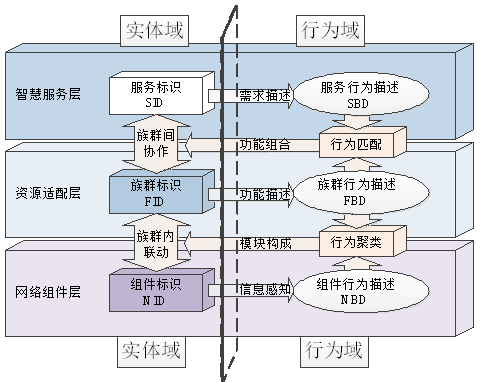Home /National Engineering Research Center of Advanced Network Technologies
National Engineering Research Center of Advanced Network Technologies
1. Introduction
The Awarding Ceremony
National Engineering Research Center of Advanced Network Technologies (denoted in short as NEL) is a new research and development institute, with the main objectives to conduct strategic and advanced research in the field of Next Generation Internet, to participate in the industry standardization bodies, to promote the applications of significant research results, to build long-term collaborations combining production, teaching and research communities, and to improve independent innovation capability and competitive strength of Next Generation Internet industry.
NEL is situated at BJTU with an area of around 2000 square meters. Up to date, the lab has equipped with various equipment of cost over 100 million RMB. It owns a complete set of IPv6 network switching equipment and performance testing devices. NEL has Academician Lemin Li as the Laboratory Consultant, Academician Junliang Chen as the director of the Technical Committee, Academician Hequan Wu and Academician Bingkun Zhou as the vice directors of the Technical Committee. Prof. Hongke Zhang is the director of NEL, who has brought a large number of researchers and scholars with sound academic background and reputation together. The team of NEL consists of nearly 40 faculty members and nearly 200 Ph.D. and master students. NEL is one of the largest research team with focus on the research in Next Generation Internet development in China.
NEL has been actively engaged in the research of a number of key projects on Next Generation Internet. Up-to-date, the lab has undertaken over 30 funded projects, including the National Basic Research Program of China (“973 Project”), the National High Technology Research and Development Program (“863 Project”), Key Projects from National Natural Science Foundation of China (NSFC). The lab has applied for over 100 patents (more than 50 are granted) and more than 20 software copyright patents. NEL has submitted dozens of international standard drafts and published over 10 books. The lab has been conducting cutting edge research and has published many papers in prestigious journals and international conferences, such as IEEE Transactions series.
NEL has achieved significant technology breakthroughs in the area of Next Generation Internet, including 1) IPv6 router. NEL developed the first IPv6 router in China and received the IPv6 Ready international certificate. 2) IPv6 wireless/mobile router. This product passed the evaluation of STAA in 2004 and was awarded the national key innovative products certificate and the first-class award of Science and Technology in Beijing in 2005. 3) IPv6 Micro Sensor Router. The product passed the evaluation of STAA in 2005 and was awarded the national key innovative products certificate in 2006. 4) IPv6 Network Performance Analysis System, which passed the evaluation of STAA in 2005. 5) Identifier-based Universal Network Architecture. It passed the evaluation of STAA in 2009, and was awarded the second-class award of National Technology Invention in 2014. 6) Smart and Collaborative Network Architecture. It passed the evaluation of STAA in 2015, and was awarded the first-class award of Education Department Technology Invention in 2016.
NEL emphasizes the academic exchange and interaction with other domestic and overseas experts and scholars from various universities, research institutes and industry. NEL received the funding for university plan and has brought in more than 10 experts and scholars from abroad through “111 talent Project”.
At present, NEL is focusing on the research of the protocols, theory, key technologies and applications for future smart network, next generation mobile internet and sensor networks (Internet of Things). NEL aims to become a national leading and renowned research institute with international standard in next generation Internet area for its distinguished research activities and achievements, intellectual, technology and professional contributions.
2. NEL Team
NEL is one of the largest research and development team in the field of Next Generation Internet in China. The team is directed by Professor Hongke Zhang, who is also the academic leader in NEL, bringing in a large number of experts and scholars with sound academic background and reputation together. The team consists of nearly 40 faculty members including professors, associate professors and lecturers, and nearly 200 Ph.D. and master students.
A part of the NEL team members
Academician Lemin Li—The Consultant of NEL
Lemin Li is an Academician of Chinese Academy of Engineering (CAE). He is a full professor at the School of Communication and Information Engineering, University of Electronic Science and Technology of China. He has published 4 books and more than 300 papers including several papers in IEEE Transactions on Communications and IEEE Journals. He was awarded more than 20 national, provincial and ministerial research prizes. He has supervised more than 150 graduate students, among them, 75 were awarded PhD. His present research work is in the area of communication networks including broadband networks and wireless networks.
Academician Junliang Chen—Director of Academic Committee, NEL
Junliang Chen is an Academician of CAE and Chinese Academy of Sciences (CAS). In the 1970s and the 1980s, he was involved in the development of China’s first digital telephone switching systems, especially in the development of diagnosis programs for the switching system. In the 1990s, he was in charge of the development of the first intelligent network system in China’s telecommunications networks, which was deployed in China in 1998. This technology was transferred to several Chinese companies. His research achievements on the intelligent network systems won the first,the second and third prizes of the National Awards for Scientific and Technological Progress in 1988, 1999 and 2004, respectively.
Academician Hequan Wu—Vice Director of Academic Committee, NEL
Hequan Wu is an Academician of Chinese Academy of Engineering (CAE), experts of optical transport network and broadband information network. He is currently Secretary-General of CAE since 2009. He is appointed as the technical director of the new generation broadband wireless mobile communications network, one of the 16 major projects in the Outline of the National Program for Long- and Medium-term Scientific and Technological Development (2006~2020) of China. He is also the Director of Experts Committee of China’s Next Generation Internet (CNGI) project. He is a director of three network convergence experts group of the State Council. He is the director of China’s Standardization Experts Committee on Internet of Thing and the director of the Consultative Experts Committee for the National sensor network innovation demonstration area in Wuxi. He is a senior member of IEEE.
Academician Bingkun Zhou—Vice Director of Academic Committee, NEL
Bingkun Zhou is an Academician of CAS and TWAS. He is currently a Professor at the Department of Electronic Engineering, Tsinghua University and is also the President of the Chinese Optical Society. Previously, he was the vice director of the National Natural Science Foundation of China. He is a Fellow of the Optical Society of America and a member of IEEE, LEOS and SPIE. His current research interests include laser physics and devices, fiber amplifiers and lasers and diode pumped solid state lasers.
Academician Bingkun Zhou—Vice Director of Academic Committee, NEL
Jiangxing Wu, born in Zhejiang, Jiaxing in September 12, 1953, is an Academician of Chinese Academy of Engineering (CAE), Director of National Digital Switching System Engineering Technology Research Center (NDSC), well-known expert in Communication and information system, computer and network technology field. Besides, he is also the Deputy Director of the National 863 Program communications technology expert group of the 9th and 10th “Five-year Plan”, the Deputy Leader of expert group of communication information field of the National 863 program in 11th “Five-year Plan”, the Argumentation Committee Director of National Major Projects in Mobile Communication field (third special issue), Expert Committee Director and Chief Engineer of the National Next Generation Broadcasting (NGB). From 1997 to 2009, he was the Alternate Representative and Representative of China in APEC Business Advisory Council (ABAC), and now he is the Vice President of ABAC. He has won several national awards in communication network field, including won the first, the second ,the second, the second, the first and the first prizes of the National Awards for Scientific and Technological Progress in 1995, 2001, 2002, 2007, 2009, 2013 respectively. From 1997 to 2009, he is the Principal Investigator of “Research and development of new concept high efficiency computer architecture and system”, the major project in communication and information field founded by “863 Program”, the major research achievement was selected as “China's Top Ten Science and Technology Progress in 2013” by Academicians. In 2015, he won the National Prize for Progress in Science and Technology Innovation Team Award and the Progress in Science and Technology Achievement Award of HLHL Prize.
Professor Hongke Zhang—Director of NEL
Hongke Zhang is currently a professor in the School of Electronic and Information Engineering of BJTU. He is a member of the expert committee of the NSFC. He is also a committee member of Chinese Institute of Electronics and China Institute of Communications, the chairman of the IEEE 1888.2 Working Group. He is now the chief scientist of the project “Universal Network Architecture for Supporting Pervasive Services” “Fundamental Researches of Smart Collaborative Network” founded by 973 Project and the director of the NEL. He has published more than 100 research papers. He has authored several books, including “Routers- Principles and Technology” (2010.09), and “Smart Collaborative Identifier Network” (2016.10).
In addition, he has achieved many significant research results, including 1) IPv6 router, which is the first IPv6 router developed in 2000 in China and has been industrialized. 2) IPv6 wireless/mobile router, which received the first-class award of Science and Technology in Beijing in year of 2005. 3) IPv6 Micro Sensor Routers which has obtained the STAA in Dec 2005. 4) Identifier-based Universal Network Architecture. It passed the evaluation of STAA in 2009, and was awarded the second-class award of National Technology Invention in 2014. 5) Smart and Collaborative Network Architecture. It passed the evaluation of STAA in 2015, and was awarded the first-class award of Education Department Technology Invention in 2016. He has applied over 100 patents, and submitted dozens of international drafts to IETF.
3. Platforms
Development for “Identifier-based Universal Network (IUN)" &“Smart and Collaborative Network(SCN)”
NEL aims to overcome the serious shortcomings of the Internet and establish the future network architecture theories and mechanisms which satisfy the demands including high speed, high efficiency, high throughput and pervasiveness. Based on the existing research results from the laboratory, we develop relevant prototypes and testbeds for internet interconnection devices and key technologies for the future Internet. We further develop Access Switching Router and General Switching Router, etc. We also develop simulation and test & verification platform for the devices, and we also contribute to relevant draft and standard development.
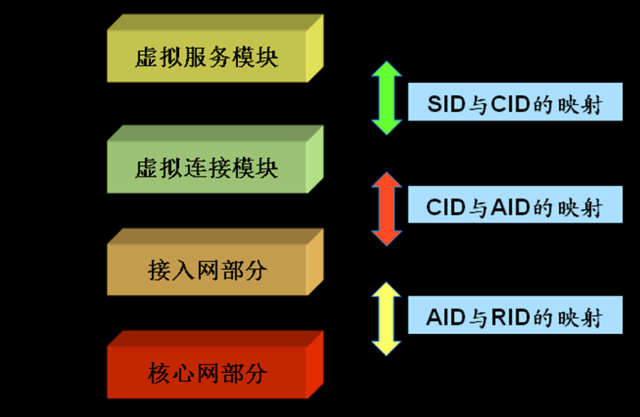
Structural Model for “Identifier-based Universal Network”
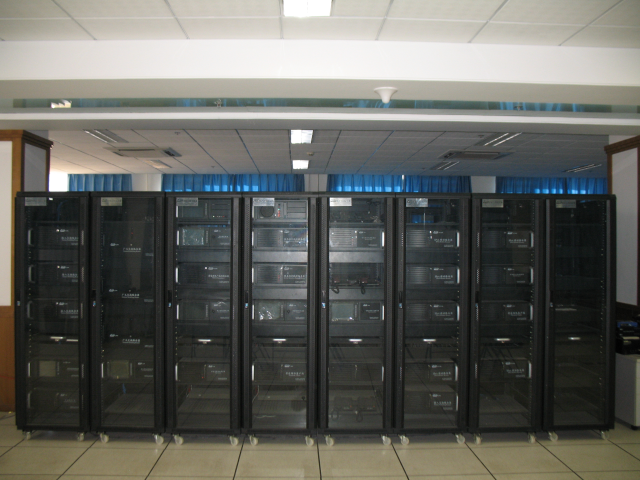
Platform for “Identifier-based Universal Network”
In December 2015, the project “Universal Network Architecture for Supporting Pervasive Services”, founded by “973 Program”, passed the expert appraisal from the Ministry of Education. The project is highly appreciated by all committee members. They all agree that the project achieves significant technique breakthrough in term of future network architecture theories and mechanisms. The achievement of this project is of world class standards and is promising for future commercialization and deployment. In 2016, based on the project “Fundamental Researches of Smart Collaborative Network”, founded by “973 Program”, the major research achievement “Smart Collaborative Network Architecture and Key Technologies” was awarded first-class award of Education Department Technology invention.
Structural Model for “Smart and Collaborative Network”
IPv6 Internet Research Platform
Through systematic analysis of key routing technologies in traditional Internet, based on the in-depth research on the mechanisms, theory and protocol algorithm of IPv6 routing and switching, we conduct engineering research on key technologies for developing related devices and test platform of the future Internet routing. We also develop simulation and test verification platform and produce related protocol standards.
We have developed the BJTU R3600 IPv6 Router based on the hardware architecture of the IXP2400 network processor and general-purpose processors with various high-speed network interfaces.
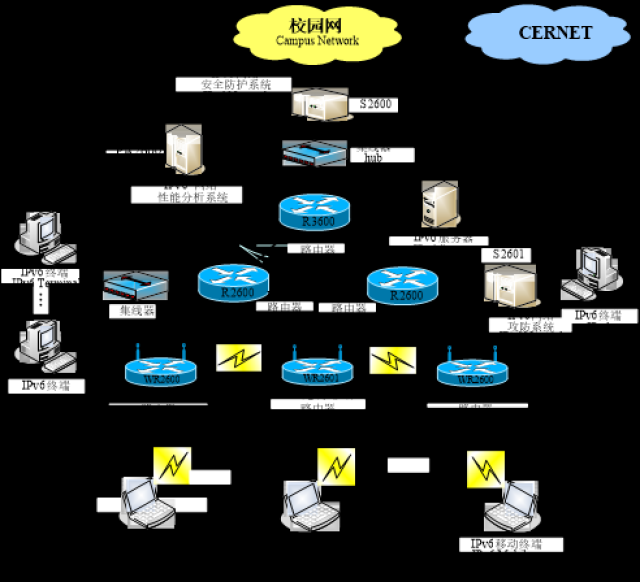
IPv6 Internet Research Platform
Mobile Internet Research Platform
Based on the research results on IPv6 routing and switching technology, mobile wireless networks, we have investigated the key technologies for mobile internet interconnection devices and built corresponding development and testing platform. We have performed research on key technologies for mobile routers and have developed related devices. We have also established the equipment simulation and test verification platform, and promoted the standardization of related techniques and protocols.
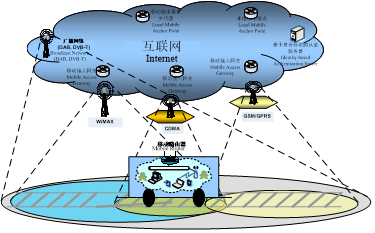
Research Platform for the Mobile Internet
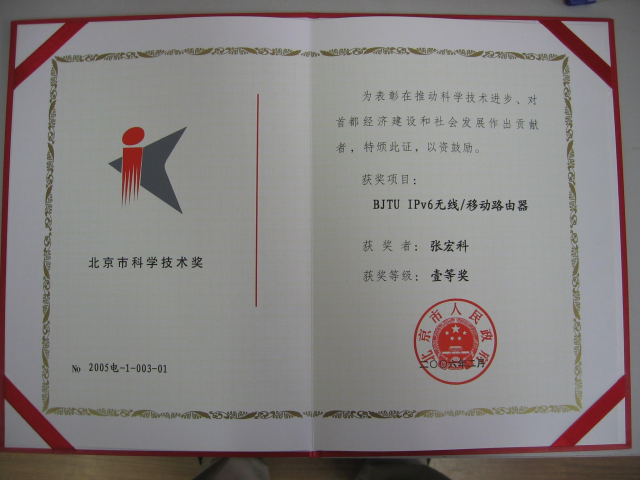
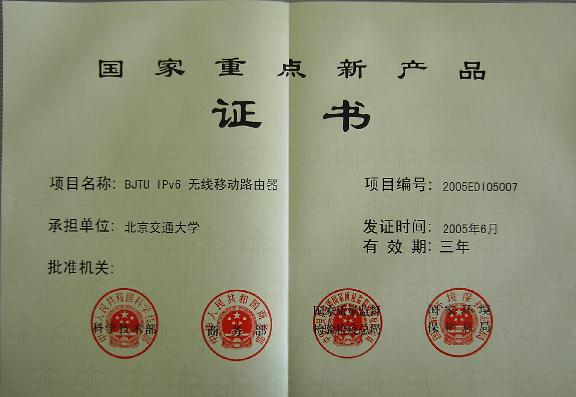
Award Certificates of BJTU IPv6 Wireless/Mobile Router
Wireless Sensor Networks (The Internet of Things) Research Platform
Based on the thorough analysis of the key technologies of wireless sensor networks and previous achievements from the laboratory, we investigate the key techniques, such as the sensor network architecture, routing, transmission protocols, super-frame design, topology control, node positioning, system synchronization, low cost and low power sensor node design, micro operating system and software protocol stack design. We have also developed a platform for research, deployment, experimental tests for key technologies on wireless sensor network, and have put forward some protocols to standards.
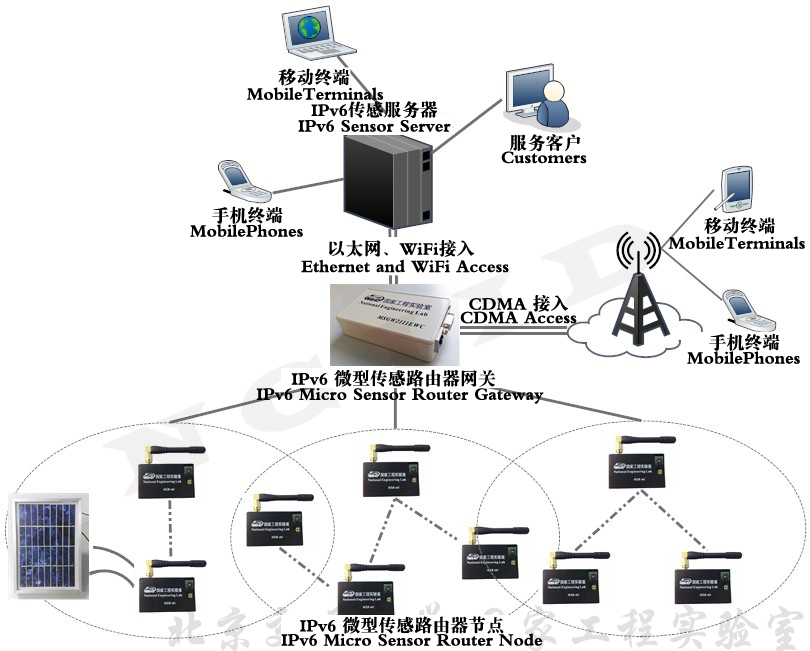
Research Platform for Wireless Sensor Networks (the Internet of Things)
IPv6 Network Security System Research Platform
Based on in-depth analysis of the mechanisms, theory and protocol algorithms of IPv6 network security, we conduct engineering research of key techniques of related device. We also establish a development and testing platform for key technologies research on network security and promote related standards formulation.
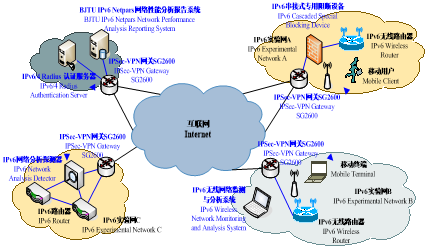
IPv6 Network Security System Research Platform
Network Devices Testing Platform
We have designed and built the testing and application platform for the Next Generation Internet Interconnection Devices. The platform provides the first class experimental environment. In addition, it provides the experimental foundation for the major national engineering projects in the field of the next generation Internet.
4. International Exchanges and Collaborations
NEL has invited more than 10 experts and scholars from abroad through “The Program of Introducing Innovative Talents to China Universities” (the talents introduction base for information and technology innovation). With the collaboration partners, more than 50 papers have been published, and more than 30 seminar presentations have been given.
NEL hosted the third International Conference on Mobile Ad-hoc and Sensor Networks in 2007, and the First International Conference on the Future Information Networks in 2009.
